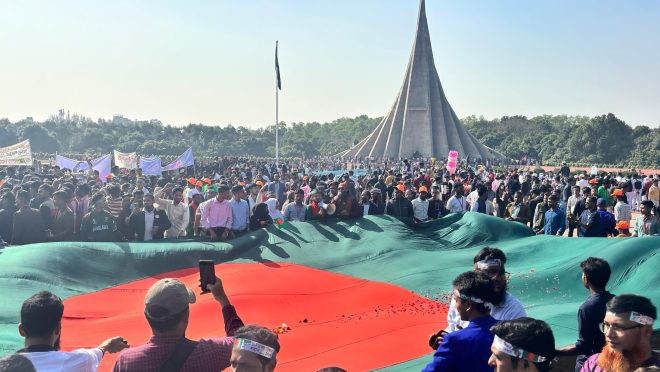16 December: A testament of resilience and ongoing battle for democracy
16 December: A testament of resilience and ongoing battle for democracy

The freedom struggle in 1971 was one of the bloodiest and most heroic strides in the 20th century, yet the self-rule of the Bangalis did not fully eradicate the injustices and over the next 53 years, the country witnessed two mass uprisings. One in the 1990s that ousted H M Ershad, and the recent struggle for which a 17-year regime headed by Sheikh Hasina was toppled at the cost of thousands of lives.
After 53 years it begs the question of why we could not establish a dream Bangladesh where social injustices and political corruption did not hold such a significant chokehold in the county’s development.
The new generation is seeking retribution. The constitution as well as the promises of 1971 did not come to fruition. Bangladesh still lacks democratic institutions, still suffers from economic inequality and has yet to establish a culture of freedom of speech.
The birth and continuous struggle of this nation seem to be an ongoing repetition. Right after Pakistan was born, the nation’s resilience was challenged in the struggle to establish Bangla as a state language. Again the challenges continued for fairness and social justice in the elections of 1954 and 1970 and finally when it was evident that there was no hope, the people rose up and gave their lives for the freedom we take for granted today. The 23 years under the Pakistani Military Junta forced East Pakistan to undergo massive political repression out of which the need for independence was evident. A triumphant victory in the 1970s election of the Awami League sealed the manifesto of the desire for autonomy of the Bengalis. The nation united against the regime, and finally fought a gruesome war in which 3 million people died and countless war crimes committed.
16th December was the day the mighty Pak Army surrendered and a new nation called Bangladesh was established. The dreams of the Bangalis it seemed had become a reality and there was no time to look behind.
fight against an oppressive regime. The irony is the same regime which led the struggle for independence in 1971, was the one to establish similar injustices which they had fought against.
This time the nation will celebrate its 53rd birthday, with more hope and enthusiasm. The commitment towards justice and the challenges for equity are an ongoing struggle. With the backdrop of the July massacre and the newfound hope fueled by the new generation, this birthday is something special. The patriotic nature of the Bangali people and the will to fight against injustice is once again the centre point of conversation and with all its challenges the future is more bright than ever before.
It has been 53 years since our independence, but Bangladesh seems to be struggling to preserve the collective consciousness of 1971. This year saw another conflict fought by an entire generation that did not witness 71, yet they had the same wherewithal to fight against an oppressive regime. The irony is the same regime which led the struggle for independence in 1971, was the one to establish similar injustices which they had fought against. But no injustice can continue for too long in this country, as the youths of the nation have proved time and again.
The participation of the youth in fighting for justice makes this year’s celebration even more fulfilling. The cynical nature of politics was thought to be the reason why the younger generation mostly did not engage in it. However, the July uprising showed widespread participation of students from all social strata, standing against injustice and sacrificing their lives for the country.
The younger generation displayed courage and a sense of duty for their country. Examples of which are many, especially post collapse of the Hasina regime where people were seen protecting their neighborhoods from lawlessness, acting as the traffic police all over the cities, and protecting religious cohesion by guarding minority establishments.
These acts of patriotism are what distinguishes the July uprising from other struggles in the past and provides hope for a more inclusive society with social justice and equality.
Though, the commitment towards justice and the challenges for equity are an ongoing struggle, this time the nation will celebrate its 53rd birthday, with more hope and enthusiasm. The patriotic nature of the Bangali people and the will to fight against injustice is once again the centre point of conversation and with all its challenges the future is brighter than ever before.


